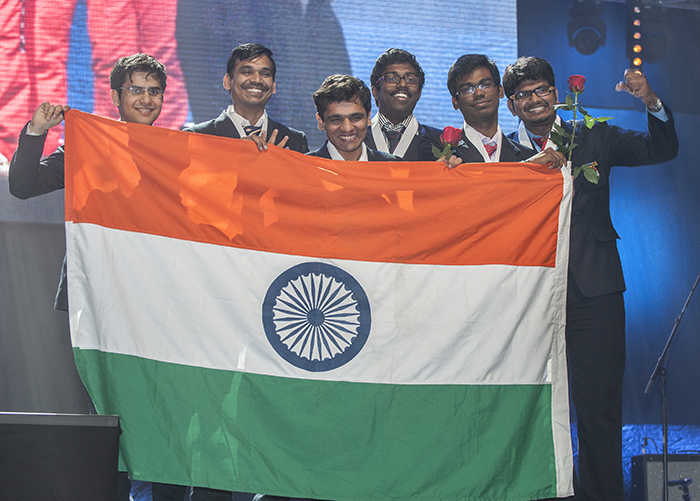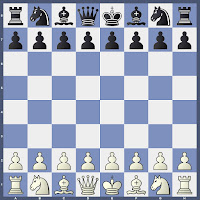Chess Olympiad - India amongst medals, creating history!
Glory is like a circle in the water,
Which never ceaseth to enlarge itself,
Till by broad spreading it disperses to naught.
- William Shakespeare
"Men at sometime, are the masters of their fate" said William Shakespeare! This Indian Chess team glorified this "sometime" of their collective living - thriving in the cold of a remote corner of this world called "Tromso" - a cold city of Norway, which forms a part of the "Arctic Circle".
L-R: Parimarjan Negi; R.B.Ramesh; K.Sasikiran; B.Adhiban; S.P.Sethuraman; M.R.Lalith Babu
The "aurora borealis" or the commonly called "northern lights", prevalent in this part of the world, found its equal in the bronze medal won by this young lions, in terms of sheen and quality!
Aurora Borealis in Tromso
How do you 'quantify' the quality of A Performance!?
For me any comparison is bad and 'to compare' is to demean one in order to make the other better. But unless we attempt at a comparison, we would not be able to show and showcase a brilliant performance to the external world - by 'external' I meant the world which lie beyond the horizon of 'chess'.
For me any comparison is bad and 'to compare' is to demean one in order to make the other better. But unless we attempt at a comparison, we would not be able to show and showcase a brilliant performance to the external world - by 'external' I meant the world which lie beyond the horizon of 'chess'.
Hence, I qualify this bronze medal performance as "historic" and the moment I do this, I am posed with the question "what do I mean by historic?"
A few weeks before this truly "historic performance" in chess, the same terminology was used to define a victory by the Indian Cricket team, in the Lords ground of England against England! That was historic not because of any individual brilliance or collective brilliance; but because India was thus far denied that feat by a superior side, not withstanding the greatness of certain Indian players, for almost three decades!
This time around, the inefficiency of the current English team to resist a mediocre Indian attack in a single session resulted in a 'historic' win! If you analyse that particular match, it will be clear that the win was not achieved by any means of brilliance.
As the fate would have it, that fragile 'history' collapsed immediately, as the victory was not forged by brilliance but rather on account of a momentary lapse by the opposition, who woke up in time and restored the 'present' from 'history'!
In comparison, the performance of Indian Chess team was against a very high quality opposition on most occasions and through sustaining high quality of play collectively as a team, for 11 rounds!! It is the culmination and consummation of growing strength and self belief of these young players who persistently matched their wits against the stronger opposition by going into their 'turf', year after year and notching quality wins consistently, which has resulted in India carving their niche in the field of chess!
In comparison, the 'history' created by the Indian Cricket team was rendered futile like a 'circle spread on water', to borrow a phrase from Shakespeare!
Well, having established the evidence and circumstances on 'how' it can be termed 'historic', now let us see 'why'.
Jonathan Tisdall commenting in Olympiad bulletin said; "The
19th seeded Indian team has had a good start to the Tromsø 2014 Olympiad -
their top four boards are all overperforming - and going into Round 7 they were
in 14th place. But on a day where the reporting team has been looking at the
halftime statistics, we wondered - how strong could India have been? If they
were reinforced with their top missing players - former world champion Vishy
Anand and current world number 26 Pendyala Harikrishna - India's average for
their top four rated players would be 2706 - and make them the fourth seeds."
And so, despite the absence of the two highest ranked player, the team out-performed their perceived potential. As Sasikiran said, the team spirit and the ability to raise above self, and co-create amongst these youngsters was pivotal to this fine performance! Indian players played actively on all boards and kept pressurising their opposition, be it world no:2 Aronian or former world champion Kasimdzhanov.
In short, the team's consorted effort was towards simply playing to their best of ability and not to wane in their effort: play every move and every game as if it is the important one and not thinking of anything else - just like playing the ball on its merit in cricket which is considered a virtue.
Tisdall raised a question on this surprising result of India - which I call 'historic' - and said that this would "provide ammunition for critics of the tie-breaking and pairing system". Well, that was for the unquestionable fact that the Indian team did not play more of the top 10 placed teams.
But this cannot take away the glory achieved by this team, especially against all odds as Tisdall himself pointed! Indians did play Aronian and his Armenian team; they did play Naiditsch and his German team; they did trounce Kasimdzhanov's Uzbekistan team 3.5 - 0.5 for the medal, and deserve every bit of it!
This team spearheaded by seasoned Krishnan Sasikiran, has every one of its members: Parimarjan Negi, B.Adhiban, S.P.Sethuraman & M.R.Lalith Babu, trail blazing their path thus far, by sheer handwork and consistently increasing their playing strength and sustaining the standards. They can only improve further and this medal winning effort would only end up enthusing many more youngsters to take the game very seriously and take on the world, in the coming years!
In chess, like in any other game, the crux for winning or more precisely getting a desirable result (as sometimes even a draw against a top class player is a good result!) is to induce the opponent to play inaccurate moves! I shall explain this through three examples from Indian players.
Take for example the game played by Parimarjan Negi against seasoned Grandmaster Victor Bologan:
Parimarjan Negi - Victor Bologan (position after white's 21.Qg2)
White initiated a pseudo attack on the kingside and the presence of knight on f5 and the heavy pieces on the g-file was enough to instil some doubts in the mind of black player and induced him to play couple of inaccurate moves:
21)....Bd6?!
The bishop was well placed in "f8" guarding the vital dark squares around his king and all that black needed to do was to clear the second rank say by Nd6 for the defence of his king and be ready to exchange pieces to blunt the attack initiated by white and start playing on the other side of the board.
22) Ndf3 Rg8?
An invitation for further attack and in fact with his next move white even started threading mate! The game ended fast in another 7 moves.
A similar example is the game between Negi and Kovalyov Anton.
Parimarjan Negi - Kovalyov Anton (position after 29.Qf3)
White had just repeated the moves 28.Qh5 Rh6; 29.Qf3 and if black plays Rf6 again, he has to go Qh5 and sign truce.
Neither player can change course: black because of the mate on "h8" and white because of the loss of bishop on "f5" and the potential back rank mates!
Black unwilling to repeat played a decent move:
29)....Qc5; 30) Rgf1 Qc7; 31) g4!?
An inducer! Still black could play 31)...Bf5 or the computer suggested 31)....Rf6 and maintain equality.
Greed is the chief of all vices and shows its ugly face at the most inappropriate times! I attached the symbol of !? for Negi's 31) g4, not because it is particularly an interesting move, but for the move's ability to induce greed into the opponents mind!!
The move played serves many 'purpose': the bishop on 'f5' is protected; the pawn on 'g3' (and indirectly the pawn on 'h3' too!) is fortified and in addition to this, the move also 'threatens' "g5"!
The antidote for it has already known to black - Rf6; if he is still reluctant to exchange that bishop!
But black sees a mirage, and plays....
31)....Qg3?
White is in no way obliged to him for playing the stupid 32) Qg3?? which alone can justify black's move!
32) g5!
As the mirage 'evaporates' as we near it, so did black's dream and he wakes up to a rude shock of losing a piece by force!! The very unsupported square for white "g5" which black tried to exploit, led to his demise!
32)....Qg5; 33) Be6 Rf6; 34) Qg4! and it was curtains for black!
Nisipeanu Liviu-Dieter - Sasikiran (position after 28.....Rxa8)
White reached this somewhat difficult position which however is not without play for him. His pieces are quiet active and the pawn on "b7" can be a potential target in some remote endings. He could have even played the computer suggested 29) Kd1!? instead of....
29) Bb1?
This is inexplicable and hands strong initiative to black right away. The bishop is already on a good square and there is no urgent necessity to cover the "a2" square.
29) .....Rg8!; 30) Kd1
One move too late!
30) .....Qe3
The alternative 30) .....Qh3 is also good.
31) Qe3 Be3; 32) Re1 Rg1; 33) Bd3
Deja-vu! The bishop travelled to "b1" and back but the world now has changed around it!!
33) .....Nd7!
Heading for the "e6" square to gobble the "d4" pawn, whilst blocking the path of white's light squared bishop to "c8" square to attack the only weakness "b7"!
34) Ke2?
Misconceptions never come singly! 34) Bf5 inducing 34) ......e6, denying the square for black knight is desirable, and would have prolonged the fight - after all that is the best a player, who is on the receiving side can do, be it chess or cricket or any other game!
34) .....Re1; 35) Ke1 Nf8!; 36) Bf5 Ne6!
37) Be6 fe6; 38) Ke2 Bf4; 39) h3 Kg7; 40) Kd3 Kg6; 41) Be1 Kg5; 42) b5 e5; 43) bc6 bc6; 44) Bf2 ed4; 45) Kd4 Kf5; 46) Bh4 Be5; 47) Ke3 Bf6; 48) Be1 Bb2;
and White resigned
I have just shown you three positions to explain how mistakes were induced by applying pressure persistently. You would be astonished to see the number of mistakes that crept in the masters play in this tournament, which even did not spare the current World Champion Magnus Carlsen against Naiditsch, where the game fluctuated from advantage for Carlsen to equal to loss!!
Well, it is time for the young Indian Olympiad medallions to revel in this "historic moment" and I hope both the central and state governments would reward them suitably, if not more, at-least commiserate to what they did for the Olympic medal winners!
Congratulations to each one of the Indian Team members, we are proud of you!








.jpg)
.jpg)

Comments
Post a Comment